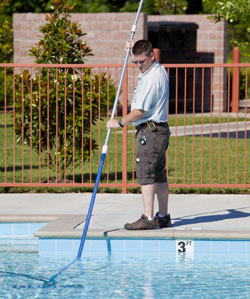
Tips on Testing Your Pool Water
Evening is the optimal time to perform an assessment of swimming pool water. When using test strips, be careful not to drip any water into the test strip container. This will contaminate your test strips. Choose a part of the pool that does not have water flowing in from the pool's filtration system. Submerge the strip elbow deep, then allow a half minute to elapse and check the coloration. When using a reagent test kit, you should choose a suitable pool area, then dip the tester into the water up to your elbow. Following this, add the correct number of drops and make a comparison with the chart.
You really need to heed the instructions that follow. Don't conduct the testing until four hours or more have elapsed since last swimming in the pool. Test your pool water four times weekly. After rain and windstorms, you must wait 8-12 hours before testing. It's not usually good to test on the weekend because neighbors may be doing lawn care activities that cause debris and chemicals to fly through the air. These things can end up in your pool and negatively impact your readings.
If you tend to have normal readings for a period of more than 3 weeks, and then all of a sudden, your reading spikes or dips, wait 24 hours and take another reading. Chances are it will self-correct. In the event that the test reads no different after a full day, you can then proceed to adjusting the pH. Make sure to make minor adjustments instead of going overboard. Perform the adjustment, wait six hours to do the testing, then perform the step again if needed. After adding chemicals to the pool, wait 6-8 hours to test.
Remember to exercise caution as you apply chemicals. Don't just dump them in all at once. It is important to wait 4-6 hours between application of different pool chemicals. Avoid explosions! Don't put calcium hydrochloride in your chlorinator. This is doubly true if chlorine tablets such as Tricor are used. Avoid wrecking the filtration system! Don't ever add shock to your pool skimmer.
It's a good idea to shock your pool late Sunday afternoon. Generally speaking, people will probably not be swimming again for a full 24 hours, so your pool will have time to settle after the shocking. You should shock your pool at sunset. Then the shock will do it's work overnight, before sunrise. It is most effective to wait 4 hours after applying algaecide prior to adding pool shock.
Tip: If you don't have time to worry about testing your pool water, give a pool cleaning service a call today.

